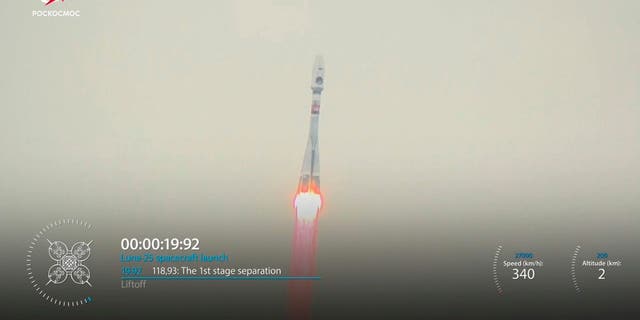Russian moon mission ends in disaster as lander has ‘ceased to exist’
Russia’s Lunar lander failed on approach and crashed into the surface of the moon on Sunday, marking an end to Russia’s first lunar mission in 47 years.
Russia’s spaceflight group, Roskosmos, announced the failure in a statement, saying the craft ran into a problem as it attempt to enter a pre-landing orbit. The Luna-25 spacecraft had been scheduled to land on Monday, but Roskosmos says it careened out of control and crashed into the moon around 12:00 GMT on Saturday.
“The apparatus moved into an unpredictable orbit and ceased to exist as a result of a collision with the surface of the Moon,” Roskosmos said in a statement.
Roskosmos says a commission has been set up to investigate the cause for the failure. It was Russia’s first trip to lunar orbit since 1976.
ATTACKS ON UKRAINIAN GRAIN DEPOTS SHOWS RUSSIA UNABLE TO SECURE ‘CLEAR MILITARY VICTORY,’ EXPERT SAYS
The probe was intended to search for frozen water on the lunar surface, but the international prestige of the mission was far more important for the Russian government than any scientific discoveries.
“Study of the moon is not the goal,” Russian space analyst Vitaly Egorov said previously of the mission. “The goal is political competition between two superpowers — China and the USA — and a number of other countries which also want to claim the title of space superpower.”

The Luna-25 mission was the first ever to attempt a landing at the moon’s south pole, where researchers have long suspected frozen water may exist.
RUSSIA TARGETS CITY OF ODESA WITH MISSILES AND DRONES; UKRAINE SAYS IT SHOT THEM ALL DOWN
The failure of the Luna-25 mission underscores the decay of Russia’s space program since the Cold War, when it went toe-to-toe with America’s NASA.

The Russian program was the first to launch a satellite to orbit the Earth with Sputnik-1 in 1957, and again the first to launch a human being into orbit, with cosmonaut Yuri Gagarin in 1961.
Reuters contributed to this report.
Read the full article Here


